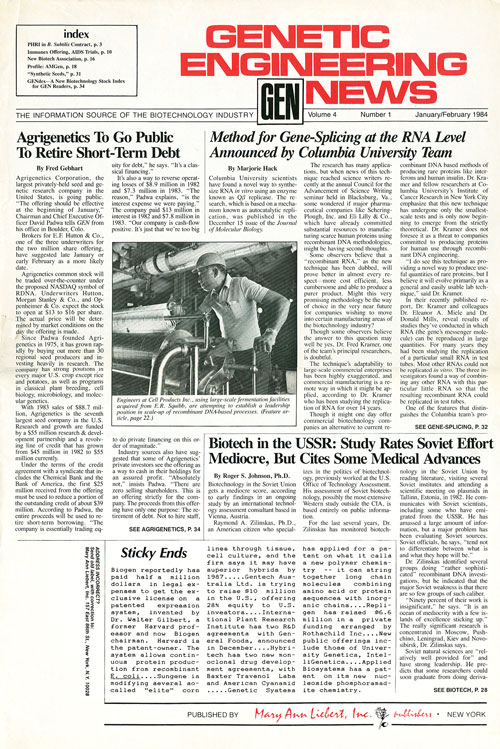July 1, 2011 (Vol. 31, No. 13)
Editor’s Note
One of the refrains the fledgling biotech industry kept hearing from the investment community in the early 1980s was, “When are we going to see products?” Such was the hope, and hype, surrounding the bioindustry then as many observers expected that this promising new industry would immediately transform new drug development.
But the R&D and commercialization processes for any novel drug for humans, no matter how it is manufactured, usually involves lengthy time periods and significant amounts of financial expenditure. To illustrate this point, this month’s GEN 30th anniversary article, from the January/February 1984 issue, recounts the cloning of the Factor VIII gene by Genetics Institute in Boston, MA. The company, and its marketing partner, Baxter Healthcare’s Hyland division, would not receive FDA approval for the first genetically engineered drug to treat hemophilia A (Recombinate) until 1992.
Genetics Institute established itself as one of the first bona fide biotech firms. It was subsequently acquired by American Home Products, which changed its name to Wyeth, which then became part of Pfizer.
—John Sterling, Editor in Chief
“As Seen in GEN—Flashback” Volume 4, Number 1, January/February 1984
Factor VIII Gene Cloned by Team at Genetics Institute
Genetics Institute of Boston, Mass. has announced that a research team led by Dr. Jay Toole has successfully cloned the human gene for the production of the blood-clotting protein Factor VIII. Factor VIII is the protein absent or defective in patients with the blood-clotting disorder, hemophilia A, which afflicts about one in 20,000 males.
Genetics Institute is not aware of any other research organization which has cloned this gene. The company sees this as the first step toward manufacture of pure Factor VIII protein from genetically engineered organisms. The cloned DNA will also be valuable as a research tool for studying the molecular basis of the disease.
The research project is being sponsored by Hyland Therapeutics of Glendale, Calif. Hyland is a division of the Chicago-based health care company, Baxter Travenol Laboratories, Inc., with which GI has a long-standing cooperative interest in Factor VIII.
The research was conducted entirely at Genetics Institute. Gustav Christensen, director of marketing for GI, termed it a cooperative venture carried out by Dr. Rod Hedwick who did the protein sequencing, Dr. Gene Brown who did the DNA probes and Dr. Jay Toole and his staff who accomplished the cloning. The next step is to decide in what bacterial or mammalian cell system to express the gene in order to produce the material needed for animal and human trials.
According to Christensen, Factor VIII is the most complex protein cloned thus far, and thus is expected to be the most complicated to express. Dr. Randy Kaufman, who while at MIT developed a novel mammalian cell vector system, is now on the staff at GI, and will have a leading role in the effort to achieve expression.
The present timetable estimates human clinical trials will begin in two years, although the company’s estimate includes caveats about inherent problems that could slow the process down.
Christensen said the drug probably will be administered by injection, as the plasma derived drug is now. Because it would not be derived from donated blood, recipients could be assured of its purity—a concern since hemophiliacs have been identified as high-risk candidates for infection with hepatitis or AIDS.
At present it is estimated that it costs $10,000 a year to treat a hemophiliac therapeutically with Factor VIII. One serious episode of bleeding, such as surgery, can cost up to $75,000 to control, he told GEN.








